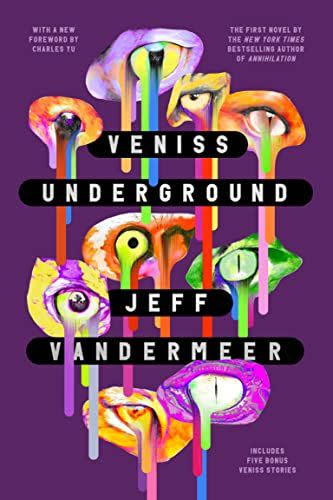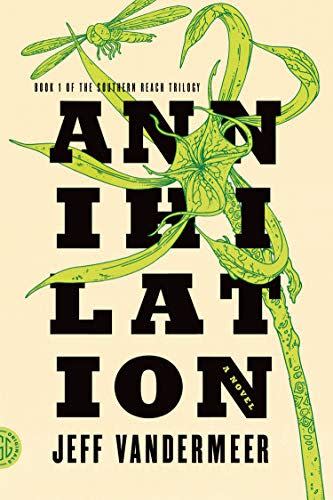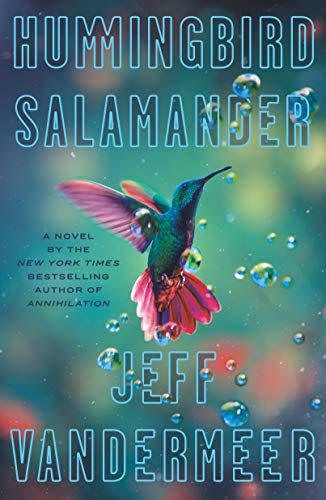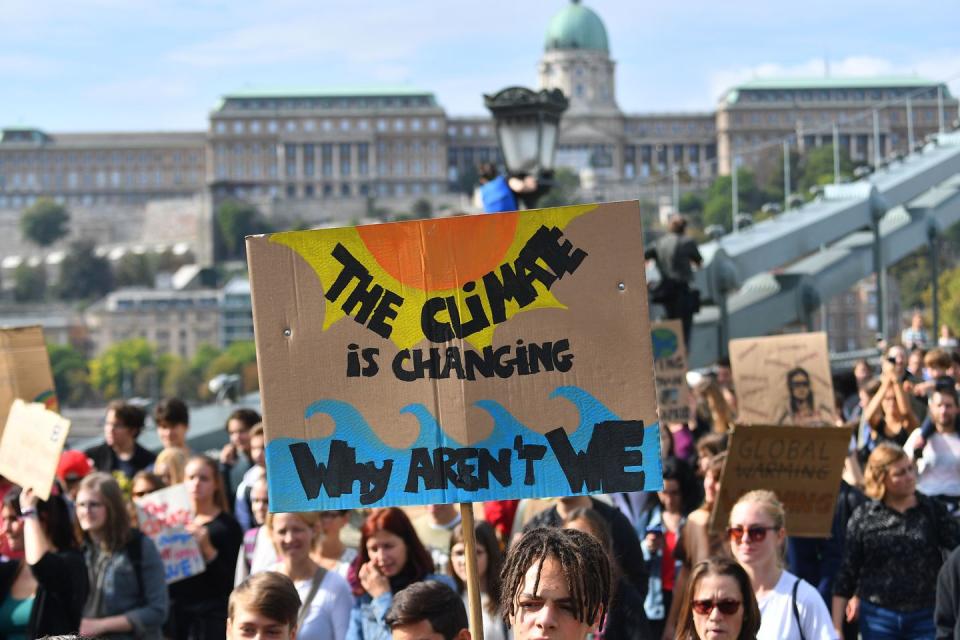Climate Fiction Won't Save Us

"Hearst Magazines and Yahoo may earn commission or revenue on some items through these links."
I can’t quite recall when I first read or heard the term “global warming,” or its successor, “climate change.” I can only tell you that it has permeated my fiction since I started writing in the 1980s. Even then, I took it as a given that human-created climate change had overtaken us, and that any future I wrote about must in some way grapple with the issue. But the term “climate fiction” didn’t yet exist—at least not in any widely used form.
Sometimes fiction reacts or reflects. Sometimes it is written in an era where the subject in question cannot help but become the underlying infrastructure and subtext. I’ve been grappling with “climate fiction” by any other name ever since I wrote my first novel, Veniss Underground, and short stories set in the same far-future world. In the story cycle, climate crisis has turned most of the world into lifeless desert. Humans, along with their increasingly rebellious biotech creations, live in fortress cities with protective walls a mile deep. Over time, climate crisis has even reached colonies in the solar system, with Earth no longer able to support them. Do they still exist or have they winked out one by one? No one on Earth knows.

$25.49
amazon.com
But if it seemed natural and right that Veniss Underground intrinsically included climate change and examined our fraught relationship to the nonhuman world (a major reason for the current crisis), then it was because I had grown up on so many other climate-adjacent works of fiction. Through novellas like “The Word for World Is Forest” and “Sur,” Ursula K. Le Guin became one of my major influences. Looking back now at the way she depicted the environment and climate with a granular seriousness about the costs of human interference, she reads like a psychic preparing readers for the current era. As I noted in an essay on The Left Hand of Darkness, Le Guin’s Lathe of Heaven (1971) depicts climate crisis conditions in a future Portland besieged by rain, while her story “New Atlantis” (1975) appears to be one of the first stories to overtly refer to climate change.
Frank Herbert’s Dune also occupies a central position in this category, but it was his Dosadi Experiment that captured my imagination, with its depiction of a narrow strip of livable space on an ecologically fraught planet. Octavia Butler’s Parable of the Sower; John Brunner’s now forgotten but thought-provoking Dos Passos-influenced novels The Sheep Look Up and Stand on Zanzibar; the jaded, faded stories of J.G. Ballard set on a polluted coastline—all of this wrack and ruin lodged in the back of my brain. It created a reality there that pushed back against how climate crisis still felt largely invisible in daily life in the twentieth century—how we could still pretend nothing needed to change.
Even though everything had changed, and fiction was changing with it.
I make no claims for the success of my ecological themes in my fiction—I only know that I have been thinking about “climate fiction” in one form or another for my entire life. I grew up in a tropical paradise in Fiji; then, at age nine, my family moved to Ithaca, New York. Coming back to the snows of Ithaca wasn’t just bracing, and it didn’t just make me homesick for parrots, parrotfish, and reefs—it made me think, in the stark cold of a merciless upstate New York school system, about nature, and what was plenty and what was scarcity. I had less in Fiji and yet so much more.
After we moved away from Ithaca, I was plunged back into biodiversity in Florida. From this viewpoint, the term “climate fiction” takes on a kind of distant absurdity. I feel at times akin to how a wild animal might feel peering out from a deep forest at a blinking neon sign on the edge of a road, advertising some mysterious product.
In part, this is because of the strangeness of how the term “climate fiction” has spread, and the way the term has made various writers and factions claim territory, even as marketing has commodified it. It all makes the baby raccoon in me want to retreat further into the woods, because even the apparatus of the terminology has become mired in all-too-human foibles and irrationalities.
Is it a symptom of this that even the title of Lathe of Heaven comes from a possible mistranslation of Chuang Tzu, as the lathe had not yet been invented at the time, and a better translation might be “equalizer of heaven”?
Dan Bloom, a journalist and 1971 graduate of Tufts University in postmodern literature, purportedly came up with the term“climate fiction,” or “cli-fi,” in 2007—and promptly became such an energetic prophet of the term that his actions bordered on obsessional. As the world warmed, and parts of it burned and other parts flooded, one man embarked on a quest to institute his term in common usage, convinced that if everyone just used “cli-fi,” the world would be saved. But that’s not the way the world works.

$11.69
amazon.com
In 2014, on the book tour for my novel Annihilation, Bloom bombarded me with emails insisting I use the term for a lecture at Vanderbilt—and then proceeded to email the organizers suggesting I wasn’t a legitimate guest if I didn’t use the term. Eventually, I had to block Bloom across social media and emails, and even threaten him with legal action to get him to leave me alone. Dozens of other writers, some of whom remained silent about their treatment, have also been subjected to pressure by Bloom over the years—many feeling legitimately harassed.
Even without this unnecessary human melodrama, in the condensed form of “climate fiction,” “cli-fi,” there lies a problem of domain and dominion—both who gatekeeps the entrypoints and how we get to write about our current precarious position. “Cli-fi” is often interpreted to be a subset of “sci-fi,” and thus it’s expected to contain a speculative element. Yet, in this moment, cocooned uncomfortably within climate crisis, as if trapped within a porcupine turned inside out, the issue is not speculative. It permeates everything and everyone, even those who have not recognized it yet. Poetry, contemporary realist fiction, interdisciplinary art installations—any creative form, in any mode, can (and sometimes should) engage with the climate crisis, even if it’s just a persistent hum in the backdrop, like a misfiring bank of fluorescent lights.
Soon after “cli-fi” entered the lexicon, science fiction purists and members of the old guard objected to the term on principle, as it coincided with a generational and pop culture shift from using the term “SF” to instead using the term “sci-fi,” with “cli-fi” seen as part of this shift. (A misunderstood internal issue by a genre whose members often have felt marginalized—even if, historically, science fiction has marginalized both non-white writers and writers of nontraditional narratives within their ranks.)
The “cli-fi” term also felt wrong—as one radio show host in 2014 told me during an interview, it sounded like it was short for “Clit Fiction,” which might profitably be considered a different sub-genre. Bloom’s efforts, submerged but breaching into visibility from time to time, hindered acceptance in the community, as well—in part because of Bloom’s nagging insistence, but also because he came from outside the (US/UK) science fiction community. It felt like a term imposed by outsiders.
When the SF or sci-fi community did come around to embracing the term “cli-fi,” they generally did so to suggest that speculative fiction was better suited than other forms of fiction to be a laboratory for examining climate change—but this was just at the moment when, again, anyone in any creative mode could usefully engage with the crisis.
Another momentous occurrence in the discussion of “climate fiction” came in 2016, when Amitav Ghosh published The Great Derangement, and managed to illuminate, irritate, and reinvent the wheel all at once. His thesis that not only was more literary fiction about climate crisis necessary, but that only the low “generic outhouses” of science fiction, fantasy, and horror engaged with the crisis at all, rankled and stank, especially as he also perversely suggested that the “manor house” of literary fiction adopt some of the techniques of speculative fiction by engaging in the surreal and the phantasmagorical.
In addition to consigning SF to outdoor plumbing rather than an indoor toilet, Ghosh mainstreamed already established ideas for general readers, like the concept that climate change is uncanny in the sense of manifesting as a haunting to human beings—something invisible that seems vast in power and scope. To any writer keeping track of these issues, or any academic discussing them at conferences, it was less revelation than regurgitation. To the science fiction community, it alienated many to be told that a whole tradition of grappling with environmental issues (and, yes, the climate) was worthless. Many fell back on a territorialism both justified and pointless.
As someone influenced by Vladimir Nabokov, Angela Carter, Amos Tutuola, the nature poetry of Patiann Rogers, and gorged-upon anthologies of classic science fiction stories, I found The Great Derangement exasperating, even if, in time, I became grateful for its existence. Ghosh appeared to have built a thesis based on, quite frankly, not reading enough fiction beforehand, and a misunderstanding of the often artificial marketing construct that is “genre” fiction. At the same time, I feel not a bit of territorialism about the idea that writers outside of speculative fiction should tackle climate change.
The other part of Chuang Tzu’s Lathe of Heaven quote reads, “To let understanding stop at what cannot be understood is a high attainment.”
To some extent, to understand climate crisis is to stop trying to understand the tangled history of terminology, even as words must guide us, lathe or no.
Origin stories aside, all of this detritus of the human world of boundaries and terroir begs the question: Is climate fiction even useful—and if so, how? (What if the world collapses between the time I type this and Esquire posts it online? Will a tattered, watermarked copy of Annihilation really be of use to anyone?)
One brand of popular climate fiction that I call “The Author Just Discovered Trees” presents a kind of existential dilemma. On the one hand, the most famous novel in this genre, Richard Powers’ The Overstory, has no doubt imbued hundreds of thousands of readers with a deeper appreciation for the biosphere. On the other, at least for me, the novel is powerfully boring, denaturing its own structure and integrity to blurt undigested tree information across the page, with a sequel in The Bewilderment that is pure melodrama (in a bad sense). Am I happy that such pro-tree novels exist, read by so many? Absolutely. Am I at all inspired by them as a novelist? No, except as anti-example.
The circumstances under which I began to consider being more direct about climate change myself resembled in their absurdity those surrounding the term itself. While I was a writer in residence at a college in upstate New York, I made an early exit from a panel about environmental issues after too many collisions with a Marxist professor who dismissed the idea of “animal politics” as garbage. This person made faces at the Zoomed-in participant suggesting the term, proclaiming that all capitalists should be put up against a wall and shot—while also pulling down a huge salary, living in a very expensive house on the campus, and teaching students who were 70% finance majors, most of whom let out a loud cheer when Trump won the election later that year.
Bleary-eyed and feeling guilty, concerned I would have to explain my exit stage left to environmental science students who had witnessed it, the next morning, I was receptive to instruction and correctives in a classroom visit. What I heard from more than one student was the equivalent of, “Yes, Annihilation was fine, but would you write something where the climate element isn’t so round-about?”

$23.99
amazon.com
I took this seriously and produced two answers—or two solutions—in the form of Dead Astronauts and Hummingbird Salamander. The former clothed the didactic in hallucinogenic imagery and formal experimentalism, and the latter integrated an environmental element into the central mystery, hopefully making what would otherwise be inert exposition about climate crisis into actual clues useful to the amateur detective narrating the novel.
Should or can fiction be a manual for useful change? And if so, do we mean in terms of a “vibe,” or having a material effect on policy decisions? Or should it fall somewhere in-between? For example, a lot of book reviewers, clearly never fact-checked, have suggested that Kim Stanley Robinson’s The Ministry for the Future serves as a blueprint for how to achieve a livable future. Yet I tend to agree with Samuel Miller McDonald’s thorough analysis in Current Affairs, which asserts that the novel has a lot of problems on the level of both ideas and solutions. (The novelist may not be responsible for an outsized reaction to a thought experiment, but, then, the form of the novel and the author leaning into this aspect invite a “how to” reading.)
Perhaps the mistake is the idea that technology will save us, much as a human-made sea wall will always be an ignorant version of mangroves. Perhaps the mistake is too many writers being unable to see the folly of separating out the survival of the biosphere from our own survival. We tend to be poor or crude users of tools, even though we use so many of them, and fiction as a tool need not contain the added weight of expertise on complex policy matters, except to establish a credible reality. Because we don’t need fictional extrapolation, even now, to do better—we need better strategic planning, more political will, and strict regulation to avoid the worst of climate change.
If we do need extrapolation through narrative, aren’t, for example, the multi-media projects of an innovator like Ling-Li Tseng more directly “useful” in helping us navigate climate crisis and find solutions? The way Tseng uses maps and heat signals to show the hidden world of underground caves and the way water flows feels more applicable to the story of our world today than most post-apocalyptic narratives. I’m unsure if I would trade a project like “Disaster As Opportunity” for any number of fictions, because of what it makes visible and the narrative choices it makes.
For me, the best “climate fiction” uses its knowledge of the subject as underpinning, not foreground. Omar El Akkad’s American War continues to haunt me not just because the political situation in the United States slouches ever closer to the “new Confederacy” scenario in his novel, but because the socio-economic situations and underlying politics of white supremacy seem authentic.
We recognize the novel as realistic or real-adjacent by these anchors, and thus whether or not the overlay of details about climate crisis will hold up over time feels irrelevant to the novel’s urgency—and what it can tell us about the future. Like Robinson, El Akkad uses nonfiction forms throughout his novel. But they are not meant to convince us about tech—rather, they’re meant to convince us about the irrational factionalism of human beings.
An earlier novel, Margaret Atwood’s Oryx and Crake, demonstrates what happens when a writer gets certain truths “right.” The genetic scientific underpinnings of the novel are now obsolete and certain other elements feel dated, but at its core, the novel remains one of the most powerful evocations of climate crisis. That power doesn’t live in being a perfect prophet, using certain terminology, or professing loyalty to specific solutions. It shines through the individual paragraphs using details of biotech, character, and situation that will always feel timeless, yet topical.
In the sense of showing readers the psychological reality of living through some aspect of crisis, fiction has always been well-suited for the mission of immersion. One need only read the epic Life and Fate by Vassily Grossman, about the epic battle for Stalingrad during World War II, to recognize that there are moments in history where the factual and the fictional commingle, creating awe and damage both.
When Grossman writes that birds in Stalingrad began to mimic the sounds of mortar fire so that soldiers became confused about what was flock and what was flack—that is a moment when the sky tears open and we see the true “great derangement,” how complete our effect on the nonhuman, and how tenuous the border between then and now, real and the unreal.
In the current era, the dislocations of war can feel akin to those of the climate crisis, and similarly, what we read changes in the light of our perspective. Fiction that was never meant to be about our current condition becomes about our current condition, haunting us just as our condition does. What, then, is climate fiction, and what is not, as we become time travelers who contaminate all with our predicament?

Sven Holm’s 1960s classic Termush, about the aftermath of nuclear conflict in an insular, contained setting, becomes hard not to interpret as climate fiction, especially the surreal ways in which the moment becomes phantasmagorical. Driven to see the world anew, the narrator, late in the novel, writes, “We see the day when the fish leave the water and push through the sand and earth to the trees, where they bite into the bark with their skinless jaws and drag themselves into the branches, to live according to new instincts. We see the trees bare of leaves, festooned with fish skeletons, their skins rustling like a death rattle.”
Later, Holm writes, “Our fear is no longer a fear of death but of change and mutation.”
Fish in the trees, while in our present reality, birds fall out of the sky from exhaustion or thirst or starvation. In fiction and movies depicting the future, birds catch fire. Is this all exaggeration or metaphor, or just a literalization of what will become visible to us soon enough? Surely the emotion we feel in either case is more or less the same. And do we not now fear “change and mutation” as much as death? Otherwise, we might already have changed and mutated enough to survive climate crisis—in our policies, and in our daily lives.
What these examples reveal, too, is that all fiction is political, even if just by turning away from this and deciding to show us that instead. But it is not a policy map, which isn’t a failing so much as a condition of most fiction as an art form having other obligations to fulfill than, say, those embodied by a scientist, who does not make things up for a living (even though the two warring conditions may coexist in the same person).
This is why in addition to American War, I tend to treasure books like Michelle Tea’s queer climate classic Black Wave, Audrey Schulman’s Theory of Bastards, or Lidia Yuknavitch’s feminist The Book of Joan—not for facts, and not really for “the feels,” either—but for making the reader live in cascading different psychological realities related to climate crisis, and for making the reader see those places from vantages other than the heteronormative. Black Wave has a lovely, worn, day-to-day quality of people trying to make a living and get by during momentous change. Theory of Bastards allows climate crisis to loom while providing an indelible (and scientific) portrait of the nonhuman. The Book of Joan is hyper-stylized and ritualized and symbolic and messianic, with images of oilbirds in caves that haunt and provoke. Three more different books in terms of approach could not be imagined, and yet they are allied in wrenching the reader out of any sense of the usual comforts and into the uncertain future.
Such narratives tend to eschew the issue of hope and despair, optimism or pessimism—this useless binary that terrorizes climate fiction and makes more complex definitions and points of view difficult to express. This matters because I often feel that talking about the issues expressed by my novels may make more material difference in the world than the novels themselves. This is the existential question about the success of a novel like Annihilation: does the story help create change or the dialogue around it? I can’t presume to tell you the answer.
But, hooked on hope, perhaps reflecting a jaded attitude toward its own future, the book world, ever selling, requires an affirmation of the positive from climate fiction authors not required of, say, the writer of the darkest serial killer noir thriller. Again and again, I am asked to locate the hope in my novels and dissect it for the interviewer in a way I was not before I was pinned like a butterfly to the collection board of “climate fiction.”
Perhaps the underlying message is that you’re supposed to entertain the reader, but more and more, I greet the question with a weary smile-grimace that reveals the skull of me that’s likely to be buried in the ground sometime in the next twenty to thirty years. The search for hope is hopeless or beside the point. Fiction can’t save us in this particular way, although it can pretend to, but if in a book a heroine survives climate crisis, this has no corresponding nexus or loci in the real world, no matter how strong the will of the reader that it be otherwise.
Besides, the very act of writing a piece of fiction, rather than, say, retiring in a bathrobe to the patio with a bottle of scotch every morning, feels like an act of hope. So to be asked the question is actually to be asked to explain yourself more than is reasonable or sane. Shall I unreasonably reassure, when the very mechanism used to articulate the reassurance will be worm-food soon enough? What is hope, then? Shall I reiterate again for the umpteenth time, as deflection, that my daughter works for a major sustainability company and that as long as she has hope, I shall have a side of hope with my scotch, too?
Even this is a kind of lie, too. My daughter doesn’t deal in hope—she deals in science and solutions and keeps doggedly supplying those solutions to whatever cities and companies allow her to do so.
She will keep doing so, no matter that hope lies in tatters, no matter that the Doomsday Clock clicks closer to a final opinion.
You Might Also Like

